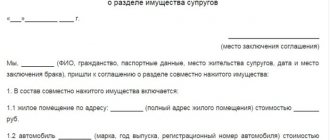Is it possible to divide marital property without divorce? The answer is yes, you can. There are several ways to do this. But first things first. To begin with, let us turn to the current legislation, which establishes a certain procedure for the ownership and disposal of movable and immovable property for persons who have entered into a marriage.
Let us remind you that in Russia, a “civil marriage” between a man and a woman has the right to be called such if it is legally formalized, that is, there is an act record about it in the civil registry office, on the basis of which the spouses are issued a certificate. Other forms of marriage, such as cohabitation, are not recognized by law.
Legal basis of joint property in marriage
From the moment of official registration of marriage, the husband and wife acquire a number of rights and obligations defined by the Family Code of the Russian Federation.
In particular, within the framework of Article 35 of the RF IC, spouses have the right to:
- the use of funds received as a result of labor or economic activity after the wedding, regardless of the size of each person’s contribution;
- inheritance of property in the event of the death of one of them;
- use of property, including real estate with the right to dispose of or express consent or disagreement, which is important when selling the same house or apartment.
Also, spouses are obliged to financially support each other, especially if one of them finds himself in a difficult situation, for example, has lost his job, acquired a disability, or is on maternity leave, and therefore is unable to provide for himself.
That is, marriage presupposes not only living together in love and harmony, but also the emergence of property rights, expressed in the ability to dispose of property, which from the moment of registration is common, taking into account certain rules determined by law.
So, in particular, by virtue of Article 34 of the RF IC, the following types of property and income are considered joint ownership:
- wages and income from business activities;
- real estate and vehicles;
- securities, cash deposits in banks;
- household items for everyday use;
- jewelry and art objects.
At the same time, in accordance with the norms defined by Article 36 of the RF IC, the following do not apply to common property:
- objects or real estate received as a result of a gratuitous transaction, that is, by gift or inheritance;
- things and living quarters belonging to spouses before marriage;
- personal items, namely clothing, shoes, personal hygiene accessories, etc.
Expert opinion
Stanislav Evseev
Lawyer. Experience 12 years. Specialization: civil, family, inheritance law.
It should be noted that, within the framework of Article 37 of the RF IC, in some cases, property acquired before the wedding may be recognized as common property. In particular, the same house will be included in the common property if, during the period of family life, the spouses made expensive repairs, for example, added several rooms, installed gas heating and replaced windows and doors using common funds, which led to an increase in the total cost of housing.
What is common
Only property acquired by the spouses during the marriage is subject to division. Namely:
- Any income from the work of each spouse, means of material and social support;
- Real estate;
- Movable property;
- Securities and deposits.
Thus, all joint property of the husband and wife is subject to division. It does not matter exactly how much from this list each spouse paid.
Or maybe one of them did not work at all and received no income. The property will still be joint.
For example, if the spouse is engaged in housekeeping and raising children, while the spouse forges the financial well-being of the family. Or the husband is engaged in creativity or science at home and does not contribute to the well-being of the family, while the wife is building a career.
When dividing property, they are all equal.
Important! If a husband or wife not only does not earn money, but also spends money enormously, the court may review the rights of the embezzler to half of the joint property.
Is it possible to file for division of property without a divorce?
Despite the fact that the law establishes rules for recognizing this or that property as personal or common, the priority right to distribute family property still belongs to the spouses, who often do not know whether the division of common property is possible without a divorce.
Meanwhile, Article 38 of the RF IC, the right to dispose of property is granted specifically to the owner-spouses, who have the right to determine the legal regime of their property at their own discretion and at any time, and not necessarily after the end of the marriage relationship.
That is, the husband and wife, of their own free will, can divide the things that belong to them at any stage of the marriage, of course, taking into account the rules of the law, which imply:
- equality of the parties;
- taking into account the interests of minors, that is, children that the couple has;
- execution of the agreement, in accordance with the norms of the RF IC, which predetermines its documentary form, and not an oral agreement.
Limitations of the terms of the marriage contract and agreement
Despite the fact that the content of voluntarily drawn up documents can include conditions for the distribution of joint property at the discretion of the parties, the law nevertheless provides for certain restrictions when drawing them up:
- it is unacceptable to deprive one of the spouses of all joint property by transferring it into the ownership of the other party;
- the right to property cannot be made dependent on personal non-property conditions, including moral issues;
- It is not allowed to establish a procedure for property regulation in relation to other family members.
A distinctive feature of a marriage document in the Russian Federation from a similar agreement in Western countries is the absence of issues regulating the behavior and morality of spouses depending on property relations. For example, it is impossible to set a condition for depriving the right to joint property in case of adultery.
Expert commentary
Kolesnikova Anna
Lawyer
Spouses often include in the terms of the contract a clause regulating property belonging to children that is not related to their joint property. Such a condition cannot be included in this document, because They do not have the right to dispose of their children's property. Parents are exclusively representatives of the legitimate interests of their children until they reach adulthood.
In what cases is property divided without divorce?
As a rule, up to a certain point, a married couple does not even think about the distribution of property acquired during marriage, until certain circumstances arise. The usual practice is to divide property after a divorce, but in what cases is it possible and sometimes necessary to divide joint property during an official relationship?
In particular, the decision to divide property during marriage can be made for a number of reasons.
| No. | Causes |
| 1 | The reluctance of the second spouse to share property acquired during cohabitation with children from the first marriage in the event of the death of the husband and the natural occurrence of inheritance disputes |
| 2 | For the subsequent provision of children, which is again relevant if the children are from different marriages and, therefore, the father can distribute his property to everyone only by allocating his share during his lifetime |
| 3 | When trying to avoid confiscation/sale of property in connection with a debt by transferring this or that property to the wife into her personal possession, documented |
| 4 | To ensure the integrity of the business, which in the event of divorce or death of one of the spouses, of course, will be divided, which will lead not only to controversial situations, but also to the possible termination of business activities |
| 5 | To guarantee registration of love relationships, especially if the marriage is concluded between spouses with different levels of material income |
| 6 | For the subsequent resale of an apartment or land plot acquired during marriage without the consent of the spouse and at any time |
| 7 | To obtain full ownership of this or that property in the event that the same husband is gambling, and, therefore, may lose the common apartment |
At the same time, taking into account the abundance of reasons that may prompt a couple to divide property without divorce, the law within the framework of Article 38 of the RF IC briefly formulates the following grounds for determining the property boundaries of common property:
- by mutual agreement;
- at the request of creditors;
- in court, if an amicable agreement cannot be reached.
How to divide a mortgaged apartment during a divorce
The mortgage binds even former spouses. If an apartment was purchased with a mortgage during the marriage, then in the event of a divorce both spouses must pay. An apartment purchased with a mortgage can be divided between spouses only with the permission of the bank.
You can divide such an apartment in the following ways:
- continue to pay mortgage payments, and after the final repayment of the loan, sell it and divide the proceeds in equal shares;
- one of the spouses gives his share in the apartment to the second spouse, who becomes the sole owner and the only debtor on the loan. The spouse who renounces his share in the apartment receives monetary compensation for it;
- with the consent of the bank, sell the apartment, close the mortgage loan and divide the remaining money among themselves.
How to divide property in marriage: procedure and procedure
While married, spouses have the right to personally determine each other’s property rights, but taking into account the rules of the law, which imply several ways of dividing property.
In particular:
- a couple can enter into a written agreement with the transfer of all property within the framework of Part 2 of Article 38 of the RF IC on the basis of mutual consent;
- spouses can determine the legal regime of real estate and income received by concluding a marriage contract based on the norms enshrined in Chapter 8 of the RF IC;
- property can be distributed between husband and wife in court if there is no consent of one of the parties or if there are claims from creditors to collect debt based on the share of one of the spouses.
Voluntary separation agreement
In accordance with the norms defined by Article 38 of the RF IC, a married couple, if there is mutual consent, has every right to distribute jointly acquired property at any time, but taking into account the norms of the law. This document must contain the following information:
- data of the spouses in accordance with the identity card;
- indication of the number and series of the marriage certificate;
- a list of property that has already been acquired with reference to title documents;
- approximate estimated value;
- conditions for repayment of a loan or mortgage, if the issue is being resolved regarding the property as collateral.
Moreover, within the framework of Part 2 of Article 38 of the RF IC, the agreement will acquire the status of a legal document equal to a court decision or writ of execution only after its notarization. Therefore, in order to draw up an agreement in accordance with their vision of the situation, before visiting a notary’s office, spouses must first not only draw up their version, but also attach copies of documents confirming their identity and ownership.
The agreement only provides for the distribution of property between spouses, which makes it impossible to include in the specified document conditions on the transfer of this or that property to a third party, for example, joint children. To transfer part of the property to children, it is necessary to draw up a deed of gift.
Marriage contract
A prenuptial agreement between spouses is concluded quite rarely, given that the average couple at the initial stage of a relationship has nothing to share. Therefore, this document is more popular among wealthy families.
Moreover, given that the provisions of the law apply to all citizens of the Russian Federation, the agreement must meet the following requirements:
- the registration period, which predetermines the drawing up of a marriage contract within the framework of Article 41 of the RF IC, both before registration of family relations with entry into force after registration, and in the process of family relations;
- notarization within the framework of Part 2 of Article 41 of the RF IC with the provision of data on the identity of the couple and title documents for this or that property.
Important! It is impossible to conclude a prenuptial agreement after a divorce.
Unlike an agreement, a contract may contain conditions on the right of ownership not only of property that is already available, but also of those that will be acquired in the future.
By the way, in this document the couple can stipulate the following aspects:
- the procedure for distributing income, for example, a certain amount will be intended to cover the daily needs of the whole family, and the balance will be transferred to the account of the spouse who earned the money;
- determining the conditions for supporting each other in specific circumstances even after divorce, that is, establishing the same alimony payments;
- transfer of property acquired before marriage to the other spouse into his ownership;
- the possibility of obtaining certain things or real estate into ownership upon the occurrence of certain events related, for example, to the birth of a long-awaited heir or adultery%
- the procedure for repaying the joint and personal obligations of each spouse.
When drawing up a marriage contract, a couple has the right to deviate from the rule of equal distribution of property, but not so much that in the event of a dispute the court would consider the property rights of one of them infringed due to extremely unfavorable provisions. A deliberately enslaving marriage contract can be challenged in court.
Judicial procedure for partition
The law initially gave spouses the right to independently resolve property disputes by concluding an agreement or a prenuptial agreement. If agreement is not reached, the married couple can resolve the dispute in court.
So, in particular, by virtue of Part 3 of Article 38 of the RF IC, a husband or wife can file a claim to determine the shares of each of them based on the norms of Article 131 of the Code of Civil Procedure of the Russian Federation, which contains the basic requirements for drawing up an application.
So this document should include:
- name of the court;
- data of the parties, both the plaintiff and the defendant;
- claim;
- data confirming the validity of the claims;
- reasons and grounds for division of property in marriage;
- list of attached documents;
- date and signature.
In this case, the court will initially proceed from the equality of shares when distributing jointly acquired property, but taking into account the fact that some types of property related to indivisible property can be compensated to the other party in monetary equivalent.
Spouses can divide not all property, but only certain parts of it, which actually predetermines an appeal to the court in accordance with jurisdiction. That is, if the price of the distributed property does not exceed 50 thousand rubles, the case will be considered by a magistrate, but if the value is higher, it is necessary to apply to the district court.
The claim is filed at the place of residence of the defendant or at the location of the disputed real estate, if it is within the territorial jurisdiction of another court.
The claim is paid by state duty according to the general rules specific to the division of property.
Documentation
All circumstances listed in the claim must be documented. Any fact referred to by the plaintiff must be reflected in the documents attached to the claim. If there is no supporting document and it is not possible to obtain it, the plaintiff has the right to ask the court to demand evidence.
In particular, the claim for division of property in marriage must be accompanied by:
- Marriage certificate (copy);
- Documents confirming the grounds for division of property during marriage (for example, a court decision to collect a debt from the second spouse);
- Documents for property subject to division: technical passports, state registration certificates, etc.,
- A copy of the claim for the defendant;
- Original receipt for payment of the fee.
All documents, in addition to the receipt for payment of the state duty, can be submitted to the court in copies. The originals must be taken with you to the court hearing in case they need to be reviewed and studied. If you are planning to divide property through the court in your absence, it is better to have copies notarized (but this is not a mandatory requirement).
Section of a privatized apartment
In the case where spouses receive an apartment during the privatization process, such property will not be classified as joint property. The apartment will be divided into shares between all owners who participated in the privatization.
In the event of a divorce, the spouses will not need to draw up an agreement on the division of such an apartment or determine the procedure for use; the law has already assigned shares to each of them.
If, after a divorce, the former spouses do not want to live together in the same area, they have the right:
- sell the apartment to a third party and divide the proceeds among themselves;
- one of them sells his share to the second under a purchase and sale agreement;
- sale of the share of one of the spouses to another person.
Sample statement of claim for division of marital property
Due to the huge variety of reasons that can serve as the basis for the division of property of spouses in marriage, it is impossible to develop any universal sample of a claim.
The option proposed below is the division of property in marriage due to the presence of a personal debt of the spouse, the settlement of which may affect the property rights of the other spouse.
Page 1
Page 2








